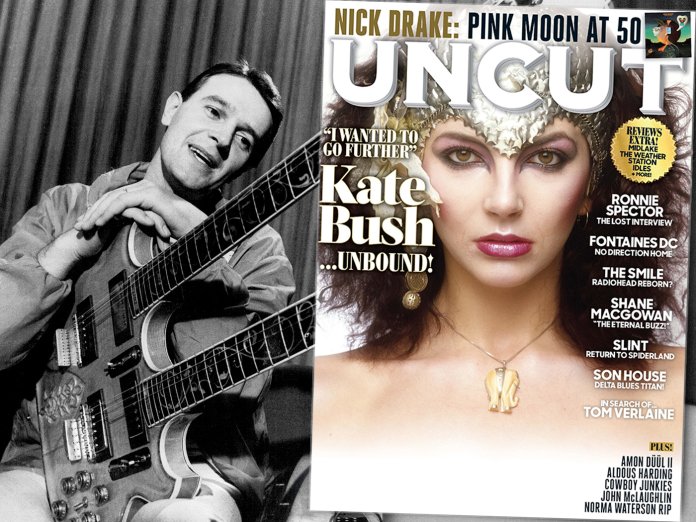On January 4, John McLaughlin celebrated his 80th birthday – but he shows no sign of slowing down. “I will not pass the day without meditation and yoga,” he tells Uncut. “It’s like eating breakfast. It’s as stimulating for me as working with Herbie or Miles.” McLaughlin is speaking to Uncut on Zoom from his home in Monaco, where he has lived since the 1980s, and where he still practises the guitar every day. “For me, playing electric guitar is like riding a motorbike – it comes easily. But the acoustic guitar, that’s like riding a pushbike in the Tour de France. It’s hard, physical work and I need to keep myself in shape. Since Covid, I’ve barely been able to play live, and I feel like an athlete preparing for a race that’s never happening. But I’ll keep on doing it.”
McLaughlin was born in Doncaster, although, having lived around the world for more than 50 years, he has long lost any traces of Yorkshire from his speech. As a teenager, he relocated to London where – by the time he was 25 – had assembled the kind of CV that most rock musicians would kill for. He’d played guitar with everyone from the Stones and Tom Jones to Georgie Fame and The Four Tops, and worked with top-flight producers including George Martin, Burt Bacharach and Tony Visconti. But despite these substantive achievements, something wasn’t right.
“The problem is that, as a session player, you had no autonomy,” McLaughlin says. “You were told exactly what to play. For a creative musician, this is torture.” So, in mid-1967, McLaughlin jacked in his lucrative session career to concentrate on his first love – jazz. Only 18 months later he found himself flying out to New York where, within a few days, he was recording with some of his jazz heroes and helping to create a brand new genre: jazz rock. McLaughlin became the first-choice guitarist for every jazzer who wanted to plug in and connect with the world of rock’n’roll, and for every rocker who wanted some jazz intensity. In 1969, he kicked off a friendship with Miles Davis, one that would
last until Miles’ death in 1991. He fronted the pioneering Lifetime, with fellow Miles alumni Tony Williams on drums, and formed the Mahavishnu Orchestra, a jazz-rock supergroup that could pack arenas around the world.
In the last 50 years McLaughlin has immersed himself in dozens of genres – North and South Indian classical music, heavy-duty fusion, Hammond funk, flamenco, contemporary orchestral music and straight-ahead jazz. Much of it is compiled in his latest album, a collection of live performances that McLaughlin has played at the Montreux Jazz Festival over the last half century. “I think I’ve played Montreux 21 times with more than 50 different musicians,” he says. “The eight tracks on this album are something of a greatest hits for me.”
What’s your first memory of the Montreux Jazz Festival?
I first went in 1971. It was already well established, but it would soon become the most important jazz festival on the planet. I’ve been playing there since the mid-’70s, it’s such a beautiful part of the world. I always loved the late Claude Nobs, who founded the festival in 1967. He was actually a chef but he was so passionate about jazz and soul that he started this festival for the Montreux Tourist Office. One man’s passion changed the entire economy of Switzerland!



